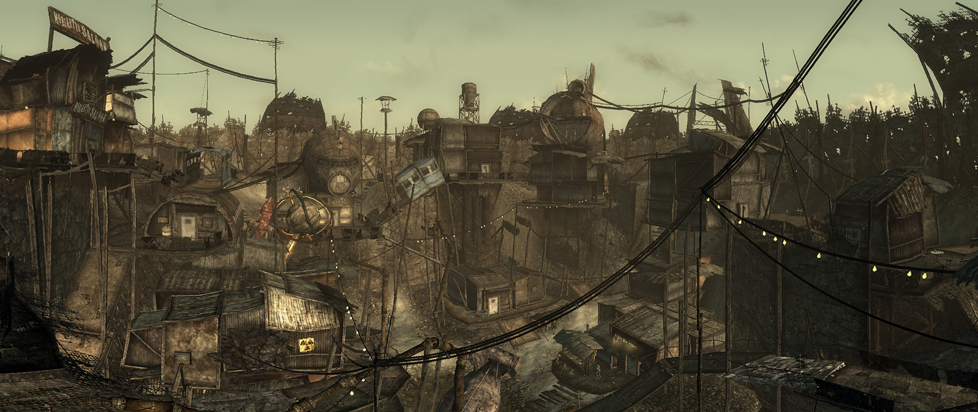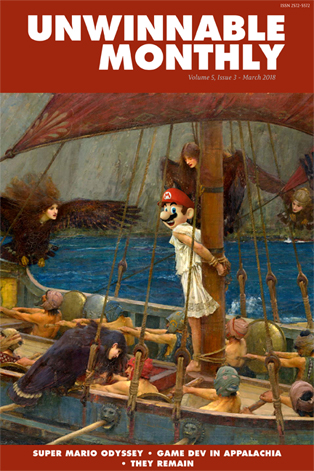
The Lone Wanderer
 This column is a reprint from Unwinnable Monthly #101. If you like what you see, grab the magazine for less than ten dollars, or subscribe and get all future magazines for half price.
This column is a reprint from Unwinnable Monthly #101. If you like what you see, grab the magazine for less than ten dollars, or subscribe and get all future magazines for half price.
———
Fictional companions and goth concerns.
———
I went to graduate school for library science – that’s a thing, yes. Although I’m not a practicing librarian now, I’ve always loved the work: researching and cataloging, giving in to my obsessive tendencies. Ensuring that everything has a name, a place, an order.
But during graduate school, consumed with organization, I missed things from my previous life: seeing bands, wearing goth makeup, sleeping where I landed, feeling adventurous. This isn’t a library school problem, nor is it unique to graduate school. Adventurelessness is usually fixable; my past adventures had rarely even required money. I could have gone to shows during library school (occasionally I did); I could have worn goth makeup.
But rather than attempting to incorporate those things into my studious life, I settled into the more comfortable escapism of a videogame: Fallout 3.
The Fallout series was new to me; I’d missed the first two games in the ’90s. The series takes place during the 22nd and 23rd centuries, post-Nuclear apocalypse, and Fallout 3 is set in the ruins of Washington, D.C. – the Capitol Wasteland. When the game starts, you use a “gene projector” to build your character’s appearance. The grungy, dystopian avatar options thrilled me. I gave myself an auburn “Wendy the Welder” haircut: a messy bun with auburn spikes sticking out in every direction, my face framed with slightly more feminine tendrils. Once I began exploring the Wasteland, I dressed myself in spiked leather armor as fast as possible. It was very punk rock.
* * *
In my analog life, I went to school full-time while working part-time in the main campus library, a gorgeous Collegiate Gothic building holding over two million print volumes. I worked in Circulation, a position for which I didn’t need a Masters degree. Circulation services are what most non-librarians associate with librarians: shelving, checking out books and directing patrons to the bathroom. I enjoyed the satisfaction of creating order, my every action contributing to the greater good of the library: a space that felt enchanted and eternal both in its purpose and its very architecture (the reading room is nicknamed “The Harry Potter Room”).
One day, I was shelving books about cinema in the PNs. Stuffing a hardcover between two weak-willed paperbacks, I found myself desperately longing to be home. In the Capitol Wasteland. The stacks warped around me, realities shifting. Home? I wanted to be home in the post-apocalypse? Hadn’t I come to library school because I wanted to create this person between the stacks – this ordered, stable individual? For several moments, I remained unmoving, processing.
Growing up, I’d constantly longed for other realms – a natural inclination for readers of fantasy novels. But I’d never experienced so viscerally the sensation that I already lived in that other realm, that my preferred parallel universe du jour was my real life. To some extent, this is a function of platform: reading can be immersive, but it’s not physical. Even the controller-based physicality of playing Fallout, combined with AAA visuals, enhanced my experience of being elsewhere in a way that books and movies never had.
* * *
Growing up, my father sometimes paraphrased a line attributed to George Bernard Shaw: “Life isn’t about finding yourself. Life is about creating yourself.” (The line may actually be from psychiatrist Thomas Szasz, who wrote that “People often say that this or that person has not yet found himself. But the self is not something one finds; it is something one creates.”) I’ve never believed I had a “self” to find; my “self” fluctuated with time and circumstance. And in that moment, paralyzed in the PNs, “myself” meant the Lone Wanderer, with my house in Megaton, my robot butler and my loyal dog.
Every day, after coming home from class or the library, I continued to escape into the pixelated skin I’d designed from eye height to outfit. She wasn’t even that pixelated.
But it’s hard to feel like an in-game universe is your real life when the game has a finite timeline. I’ve never delved deeply into MMOs, because I worry about what would happen. Or because I know what would happen. With a world as broad and aimless as the one beneath my feet – but with fully customizable character design and potential supernatural powers – why would I leave?
Spoilers ahead, but in the end of Fallout 3, my Lone Wanderer sacrificed herself to save a bunch of other people. This isn’t the only way to end the game – you can let another character sacrifice herself, for example – but it’s the conclusion I chose. I couldn’t stand the thought of The Lone Wanderer living beyond the credits, sleeping at my house in Megaton, chatting with my robot butler, shedding me and, somehow, carrying on the life that had become my life. So, I navigated The Lone Wanderer into a lethally irradiated area, and my alternate self died from exposure.
Sometimes, I wonder if my dog waits for me in Megaton, in the digital firmament. I know that no trace of me remains.
———
Deirdre Coyle is a goth living in Brooklyn. Find her at deirdrecoyle.com or on Twitter @deirdrekoala.




